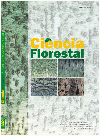
|
Ciência Florestal
Centro de Pesquisas Florestais - CEPEF, Departamento de Ciências Florestais - DCFL, Programa de Pós Graduação em Engenharia Florestal - PPGEF
ISSN: 0103-9954
EISSN: 0103-9954
Vol. 28, No. 3, 2018, pp. 1317-1327
|
 Bioline Code: cf18118
Bioline Code: cf18118
Full paper language: English
Document type: Note
Document available free of charge
|
|
|
Ciência Florestal, Vol. 28, No. 3, 2018, pp. 1317-1327
| en |
DAMAGE TO REMAINING TREES BY FOUR SYSTEMS OF MECHANIZED HARVEST IN COMMERCIAL THINNING OF Pinus radiata 
Acuña, Eduardo; Sanfuentes, Eugenio; Cancino, Jorge & Mena, Pablo
Abstract
The effect of four harvesting systems for thinning tasks (harvester-forwarder, chainsaw-skidder, chainsaw-three-wheeled loader and chainsaw-yarder) was evaluated on percentage of damaged trees and damage
surface. Additionally, the effect of the logging system and the season of the operation (winter and summer)
on the incidence of damage and surface of the injuries, and their relationship with tree diameter, was also
analyzed. Of the four logging systems studied, those carried out with chainsaw-yarder and harvester-forwarder
originated the greater incidence of damage with 34.5% and 32.2%, respectively, also producing
the greatest injuries with 349.7 and 427.2 cm2, respectively, by individual tree. The season in which the
operations were conducted is a factor that significantly affected on the increase of the number of trees with
some sort of damage, with an average incidence of 27.1% in winter and 10.1% in summer. In addition, tree
extraction with forwarder and yarder has a high potential for residual stand damage, and the stand structure
was not affected by mechanized thinning, because there were damages in all sizes of remaining trees.
Keywords
harvesting equipment; stem damage; injuries; harvest season
|
| |
| pt |
DANOS ÀS ÁRVORES REMANESCENTES POR QUATRO SISTEMAS DE COLHEITA MECANIZADA NO DESBASTE COMERCIAL DE Pinus radiata 
Acuña, Eduardo; Sanfuentes, Eugenio; Cancino, Jorge & Mena, Pablo
Resumo
Quatro sistemas de colheita de madeira foram avaliados nas atividades de desbaste de povoamentos de
Pinus radiata (harvester-forwarder, motosserra-skidder, motosserra-carregadora de três rodas e motosserra-yarder),
considerando seu impacto no percentual de árvores e superfície afetada. Adicionalmente, foi
analisado o efeito combinado do sistema colheita e estação do ano (verão e inverno), na incidência e área
de injúria, e sua relação com o diâmetro das árvores. Entre os sistemas de colheita estudados, aqueles
que utilizaram motosserra-yarder e harvester-forwarder tiveram maior incidência de injúria mecânica nas
árvores, atingindo 34,5% e 32,2%, respectivamente; como também em uma maior área injuriada por árvore
com 349.7 e 427.2 cm2, respectivamente. A estação do ano para as operações de colheita foi um fator que
aumentou significativamente o número de árvores com algum nível de injúria, variando entre 27,1% no
inverno e 10,1% no verão. Entretanto, o estudo mostrou também que a extração da árvore com o forwarder e yarder tem um alto potencial de dano residual no povoamento, sendo que sua estrutura não foi afetada
pelo desbaste mecanizado, porque foram danificadas árvores em todas as classes de tamanho.
Palavras-chave
equipamento de colheita; dano no tronco; lesões; época de colheita
|
| |
© Copyright 2018 - Ciência Florestal
Alternative site location: http://cascavel.ufsm.br/revistas/ojs-2.2.2/index.php/cienciaflorestal/index
|
|
